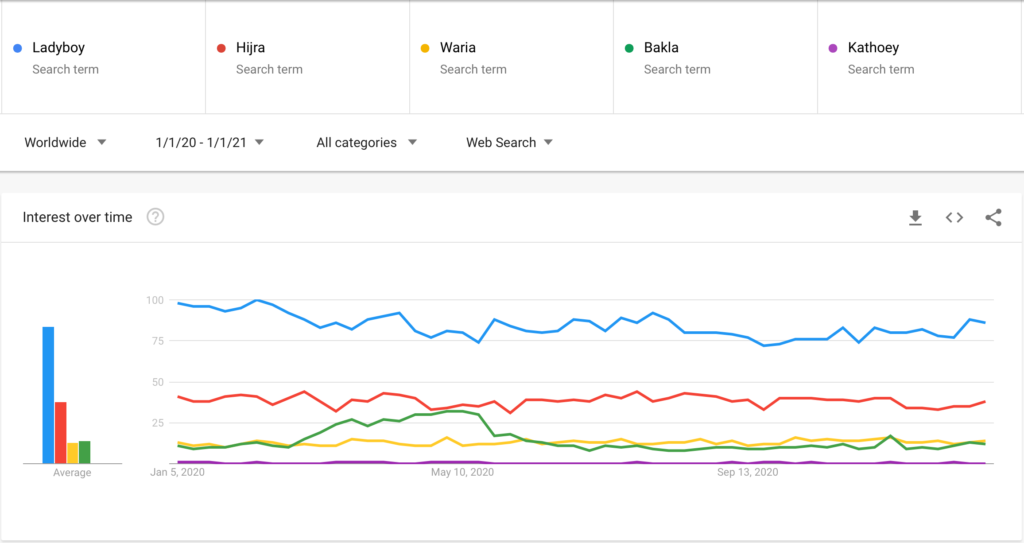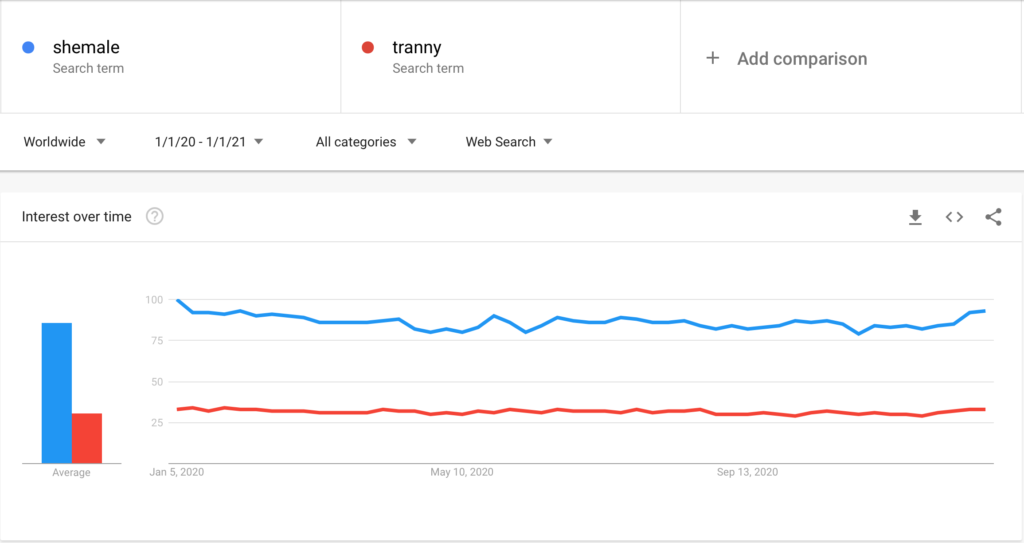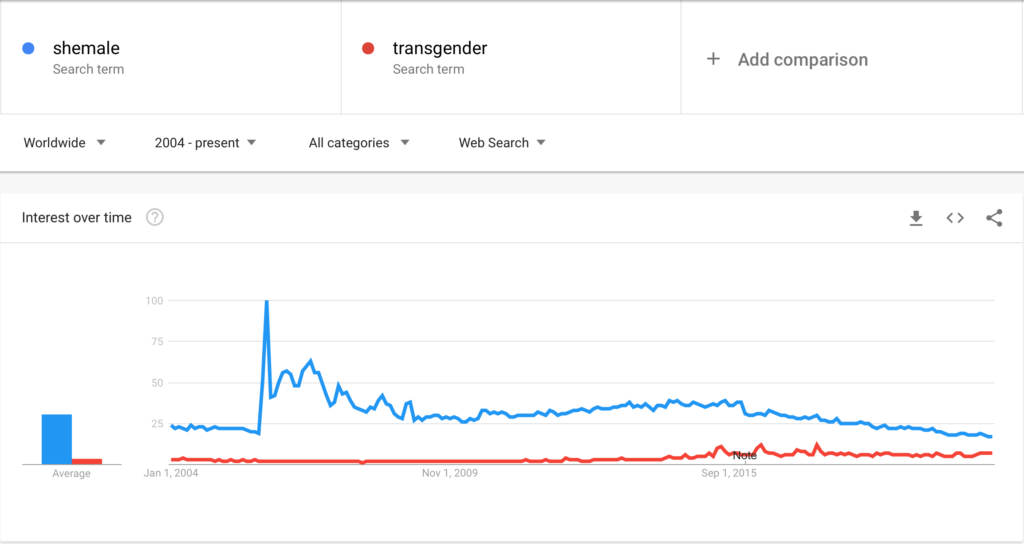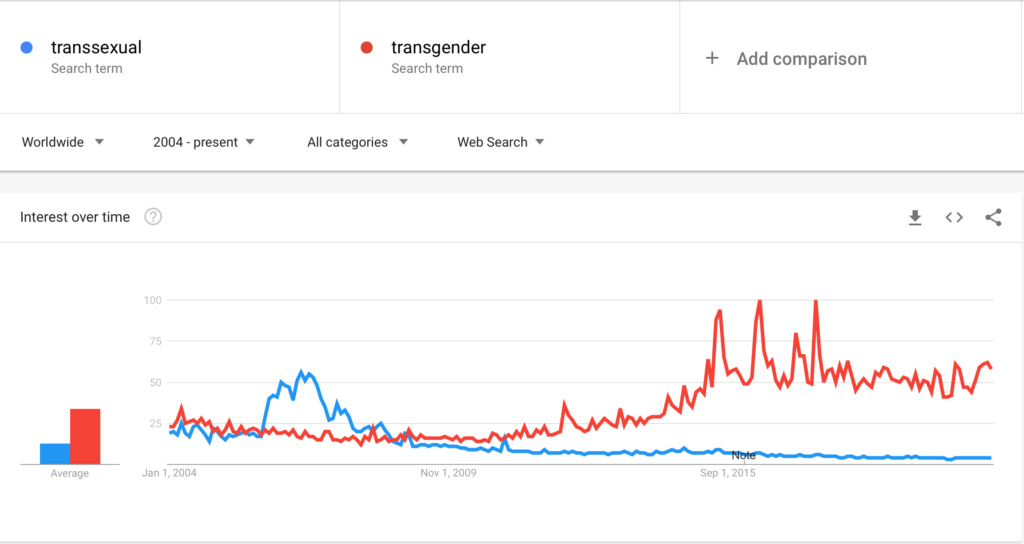
How do we call transgender women in Asia and around the world?
There are many terms that refer to transgender people. By using Google Trends data along with an infographic, we want to share with you some words that are used to refer to trans(gender) women in Asia and around the world, as well as the most popular terms on Google and what their trends are.
The results may surprise you and we will later share our analysis with you.
On this page
What is Google Trends data?
Google Trends is a tool which allows us to see what the trending searches on Google are. It’s also possible to compare what terms are searched more often on Google. To have more information about Google Trends, Simon Rogers, Data Journalist, and Data Editor at Google, did an article called What is Google Trends data — and what does it mean?. We highly recommend that you read this article. It will help you understand why we have chosen the information on our infographic.
Why are we using Google Trends Data?
Google is the leading search engine in the world. According to the Search Engine Market Share Worldwide chart from Statcounter.com, Google places first with more than 92% of the market in 2020. By using the Google Trends data, we are sure to have data which includes almost everybody in the world.
Since its creation on September 27, 2012, Google Trends has been used many times for studies to show social trends, social responses to a specific event, track health issues, explain economic changes, and even predict such situations as unemployment rates or political elections.
In the health domain, the Alexander von Humboldt Institute for Internet and Society (HIIG) was able to track social responses to COVID-19 using these datas. The National Library of Medicine used Google Trends to assess worldwide interest in irritable bowel syndrome and commonly associated treatments to help with their study. Google Trends was also used as a web-based tool for real-time surveillance of disease outbreaks by Oxford University Press.
In the financial domain, Nature Portfolio used Google Trends to qualify trading behavior in the financial markets.
And there are thousands of other exemples in many other domains as well.
Using Google Trends for Our Infographic
For our infographic, we wanted to find accurate data about the words used to refer to trans(gender) women around the world. In our case, we use the questions down below to find our data:
- What term is popularly used in search engines when compared to other terms?
- What are the usage trends of theses terms?
- What term is the most popular one locally?
The Infographic
Let’s jump to the infographic we prepared for you. You will see that there are many words that can be used when referring to trans women. The usage of these words depends on a daily basic usage, a specific industry, a historical use, or a local use in some countries.

Transcription, our analysis and sources
In Asia
It’s no surprise that Asia has plenty of words to refer to trans people.
The reason for this is that each country has a long and rich history with trans people. Ladyboy is the most searched term on Google because this term is used across Asia. With more than 1.3 Billion people, India takes second place with Hijra partly due to the country’s population. Since there are more people who can search for the word, it became the second most popular term in Asia.
The following terms are ranked accordingly after the previous two, Bakla and Bayot in the Philippines, Waria in Indonesia, Kathoey in Thailand and Newhalf in Japan.
Some of these terms started off as negative or continue to be offensive for local trans people. Due to a historical usage, they still are popular on Google. This is the case for bakla and bayot, which are also used to designate gay, effeminate, or bisexual people (being trans and gay are different things). The daily basis usage trend for them are decreasing to the benefit of the term transgender.

In the West
In Europe, North America, Australia and basically in the West, there is less diversity. We have there 2 main words used, transsexual and transgender. Or simply trans.
The “trans” prefix comes from Latin and means “across” or “beyond”. It can also be used without any suffixes. Transsexual / transgender therefore mean “which goes beyond (the binary of) sex / gender“.
Transsexual used to be the most used term around 2006-2007, but now transgender has become way more popular in recent years.
To explain that, it’s important to know the difference between sex and gender. The rise of Gender Theory in recent years pushed the notion of gender to the first rank, while making the notion of sex outdated.
In Latin America
Latin America is a special case of the West. The main term there is travesti. The term is searched more often on Google than“transgênero” (Spanish for transgender).
It was initially a derogatory term but has since been reclaimed by Argentinian and Peruvian travesti activists.
Outside of Latin America, travesti usually means “cross-dresser” (men who dress like women but aren’t transgender).
Thanks to that, travesti is one of the most used terms on Google when referring to trans people.
In the Adult Industry
The adult industry has its own vocabulary too. Trans women are not exempt from being featured in adult films. To find adult services or adult videos on the internet, people use the terms Shemale and Tranny.
People use both terms to search for the same content, but shemale is searched more often.

Globally
With the data above, we see that tranny and shemale are in first and third person respectively as the most searched terms on Google. Due to their usage, we can understand why those two terms fall in those places. According to the Forbes article How Much of the Internet is Actually for P*rn, 13% of web searches were for sensual content. That represents a huge part of the world wide traffic just for this category. To compare just 2 keywords on Google trend, the term “p*rn” is 5,29 times more queried on Google than “business”.
But that doesn’t mean that shemale and tranny are the more popularly used terms on a daily basis in real life.
Logically, travesti also has a good position in this ranking. Mainly used in South America, it’s also used to define cross-dressers in the West. Both usages of this word in the world add more search terms.
In conclusion, transgender for the West and ladyboy for the East both dominate all the other terms.
Even if shemale is the most searched term on Google, the trends for it and transgender are slowly reversing. We can then assume that transgender has a chance to be the most searched term on Google in the future. For example P*rnHub, a major adult video streaming website, renamed their “shemale” category into “transgender” in 2018.

What do trans women think about this?
We asked the Asian trans women from our team what they thought about all these terms. We also asked them what they use on a daily basis. Here are their thoughts.
« I think “transgender” is the more formal and more acceptable term. Ladyboy is a street word, the lowest of the lows, same feeling i get when filipinos call transgender women as bakla, bayot. » Cate (Philippines)
« I don’t like bakla and bayot since it means gay and not trans woman. I also don’t like Ladyboy. I always use transgender or transgender woman. Actually, I always use trans woman. Ladyboy was not so offensive in the past, but when i started to understand about SOGIE. It then became offensive for me » Nichole (Philippines)
« PH doesn’t have a specific term or word for trans women so most people just call us bakla or bayot which is an umbrella word for biological men having sexual intercourse with same sex. Tranvesti is rarely used in PH or even in Asia. » Ezzy (Philippines)
We also have some responses from different people around the world after publishing articles about these terms.
« I like to use the word “woman” when referring to a transgender woman. But that’s just me. » John
« At least in South and East Asia, saying ladyboy is perfectly ok. » Rolando (Minsk, Belarus)
« Just call us by the name, shouldn’t be that hard » Ayla (Taubaté, Brazil)
« Well even “ladyboy” I find it offensive » Bella (Limasawa, Philippines)
« Maybe I’m just old fashioned but I call her by her name. » Alexander (SC, US)
« That term (ladyboy) is derogatory, trans women are women not something for you to belittle with the use of such terms. » Emily (Mount Isa, Australia)
Compared to bakla and ladyboy, « (Trans)gender is more respectful imho… » Erwin (Flardingue, Netherland)
« I like to say transwoman or transpinay, is that considered offensive? My girlfriend does not like the term ladyboy, so I no longer use it. » Steven (Rowland Heights, US)
« I always believed in the thoughts of a third sex and with this I so really agree with the Hijra philosophy. » Daniel (Hamilton, Canada)
We hope that this infographic was both educational and interesting. You can help us improve it by giving us some other terms you would like to have included. Let us know by writing a comment below so we can contribute more knowledge to help build a better global community.




A number of them don’t use this word and prefer to be called “phuying praphet song“(Thai) which translates to“the second kind of woman“.
The reason being is because they find the word Ladyboy unfit to be used for so-meone who’s identifying as a woman.
I like transpinay (At same time I can tell she comes out of this wonderful country) or transgender.